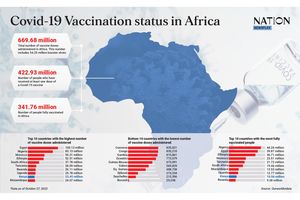Scientists developing cancer vaccines using Covid jabs technology

What you need to know:
- While Covid mRNA vaccines respond to one antigen - the spike protein on the outside of coronavirus - cancer vaccines act on several antigens present on the tumour surface.
- The mRNA cancer vaccines train the patient’s immune system to fight their own cancer.
Scientists are now using technology similar to that used to develop Covid-19 vaccines to work on a cancer vaccine.
Last month, the United States Food and Drug Administration (FDA) granted breakthrough therapy designation to Moderna and Merck’s skin cancer vaccine. This means that the two big pharmas are allowed to expedite development and review of drugs intended to treat serious conditions.
“The coronavirus pandemic has thrown a spotlight on (mRNA), which is the molecule that carries a cell’s instructions for making proteins,” researchers at the National Cancer Instutute observed.
“mRNA vaccine technology is extremely promising for infectious diseases and may lead to new kinds of vaccines,” said Elad Sharon, a researcher from the Institute’s Division of Cancer Treatment and Diagnosis.
“For other applications such as the treatment of cancer, research on mRNA vaccines also appears promising, but these approaches have not yet proven themselves.”
However, scientists remind that decades before the need for Covid vaccines, researchers had been working on mRNA vaccines targeting cancer.
This is why in December 2022, Moderna and Merck published the results of an early phase (2b) clinical trial that was investigating a combination therapy of an mRNA vaccine and immunotherapy (a drug that stimulates an immune response) in advanced stage melanoma patients.
After one year of treatment in 157 patients, they found the combination reduced the risk of cancer recurrence or death by 44 per cent.
Moderna and Merck now say they plan to follow up their initial trial with a phase 3 trial for advanced melanoma in 2023. Phase 3 trials test for safety and efficacy in larger groups of patients.
They explain that rather than preventing disease, these vaccines are a personalised treatment for cancer.
Vaccines inject part or all of a weakened virus (or other pathogen) into the body to provoke an immune response.
mRNA works by injecting only the genetic instructions and allowing the body’s cells to make part of the cancer protein (antigen) itself. This trains the immune system to develop antibodies against the protein.
When these same proteins are present on an invading tumour cell, the immune system stimulates an immune response against it.
While Covid mRNA vaccines respond to one antigen - the spike protein on the outside of coronavirus - cancer vaccines act on several antigens present on the tumour surface.
The mRNA cancer vaccines train the patient’s immune system to fight their own cancer.





